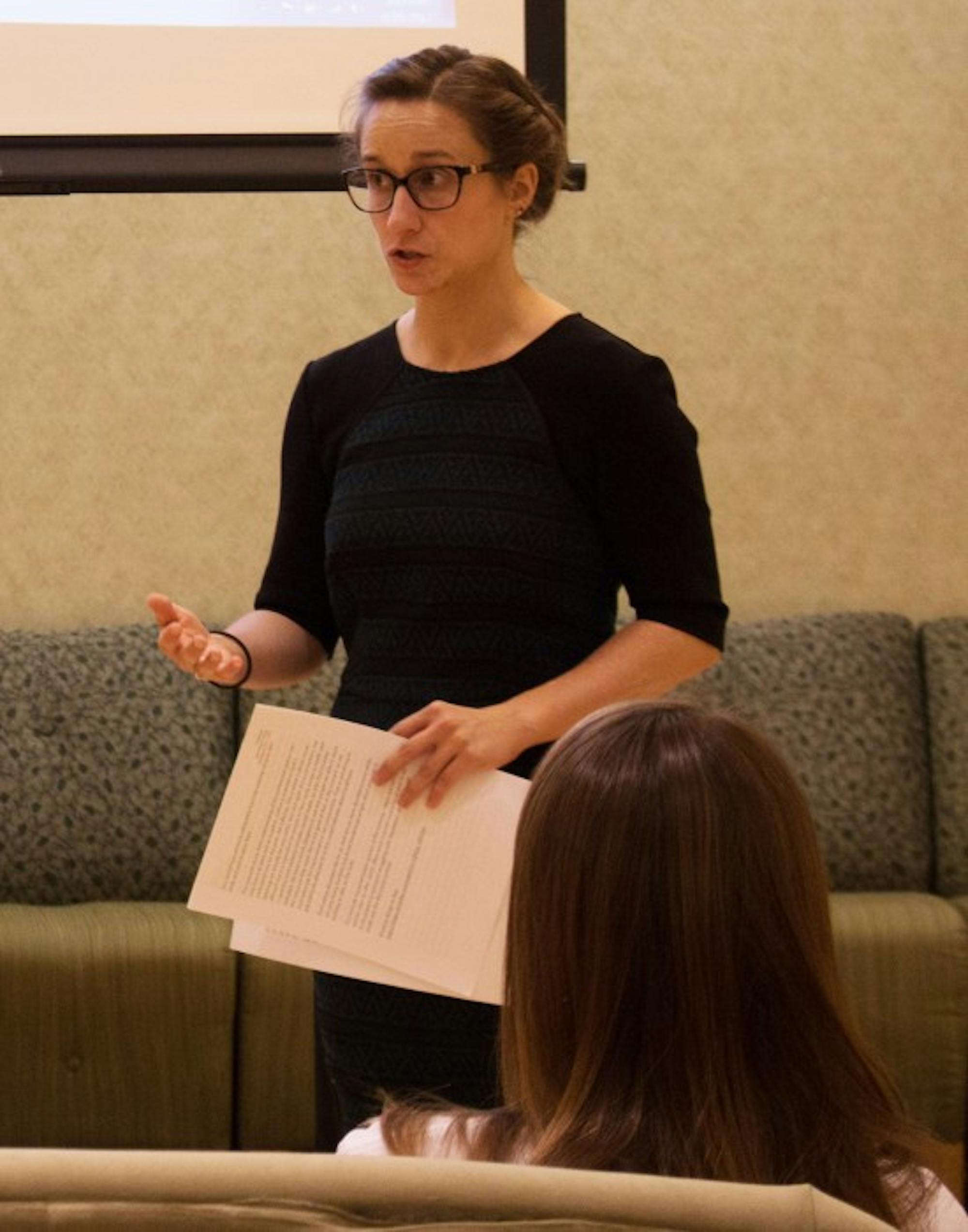As Mental Illness Awareness week approaches with the first seven days of October, Lorraine Cuddeback, a post-doctoral scholar in Notre Dame’s Theology Department, used her installation of Theology on Fire, “Responding to Depression: Theological Insights and Pastoral Practices,” to address the topic of depression. Cuddeback specializes in the field of Catholic Social Tradition, which can be traced back to the Catholic Church of the early 20th century, and reflects on worldly matters such as poverty, labor and other social issues.
“ … What the Catholic Social Tradition does is offer a really helpful framework for addressing ethical issues such as mental illness and depression,” Cuddeback said, “ … Ideally, this would be an ongoing process.”
Cuddeback referred to the Pastoral Circle, a Catholic social justice tool invented in 1980, that bridges the experience of mental illness or depression to social analysis, theological reflection and pastoral action. After showing a short film titled “What is Depression?” from Helen M. Farrell’s 2015 TED Talk, Cuddeback launched into four points that covered the current understanding of depression in today’s Catholic community.
“Depression is not rare; in fact, it’s actually pretty common,” Cuddeback said.
She said an estimated 10 percent of the world population have suffered from depression, and that over the past ten years, that number has increased by about 15-20 percent in college-aged students. These statistics only indicate people who have sought treatment for their diagnosed mental illnesses. Therefore, she said, the numbers could actually be much higher.
“Depression is not just ‘feeling down,” Cuddeback said. “There’s a difference between feeling depressed or feeling upset about something and medical depression.”
Mental illnesses like depression operate on a spectrum, which means that though symptoms might be present, clinical diagnosis only follows the crossing of a certain threshold, Cuddeback said. To be medically diagnosed, the patient must display at least five of the possible symptoms of depression. Thoughts of self-harm automatically cross this threshold, despite the normal rule of five observed signs, Cuddeback said.
“What’s really behind that is not just a number of symptoms, but recognizing that things start really interfering with your everyday life. Your ability to take care of yourself: to sleep, to eat, to work,” she said. “Depression is not all just in someone’s head. There is a real biological aspect to it.”
Like any other illness, depression manifests itself in a constellation of symptoms, including chemical changes within the body. Cuddeback said there is a false impression that because depression is a mental illness, it can be cured with sheer will power. Depression takes on real, physical symptoms that must be taken into consideration, likening mental illness to a case of strep throat, she said.
“No one says, ‘Just try to not have strep throat,’” Cuddeback said.
Though this explanation seems simple enough, Cuddeback said today’s society still does not have a complete understanding of the nature of mental illness.
“Depression is stigmatized,” she said. “People don’t take it seriously.”
44,193 people died by suicide within the last twelve months, Cuddeback said. Research projects 41,070 deaths related to breast cancer by the end of this year. While Cuddeback said she is a strong advocate for breast cancer research, she said sees a disparity in the disproportional amounts of publicity surrounding both conditions, given that suicide often results in a greater number of deaths.
“We don’t talk about depression and suicide anywhere close to as often as we talk about breast cancer,” she said.
The fact that mental illness and breast cancer share the same month of awareness makes the level of invisibility and societal stigma surrounding depression all the more glaringly obvious, Cuddeback said. By leaving our preconceptions and stereotypes of depression at the door, we can come to a better understanding through faith and reflection, she said.
Despite the shortage of official documentation addressing a theological viewpoint on depression, Cuddeback referenced a passage from “The Catechism of the Catholic Church” and a letter from John Paul II. According to “The Catechism,” a person afflicted with “grave psychological disturbances, anguish, or grave fear of hardships, suffering, or torture,” is freed from responsibility, should they take their own life. The letter from John Paul II emphasized mercy and the importance of creating structures that support people’s mental health.
Cuddeback included the theological concept of “Imago Dei,” or the idea that men and women are created in the likeness of God, and stressed the connection between the human soul and the body. She said as humans, we are sometimes tempted towards dualism, which forces us to prioritize either the body or the mind as the embodiment of the whole person. Cuddeback said we must pay attention to both.
“We are the Imago Dei, the image of God. And that is an image that involves both spirit and flesh,” Cuddeback said. “Care for the body is care for the soul, and in fact, caring for the soul is caring for the body.”
When specialized treatment and self-care isn’t enough, Cuddeback said she suggests turning to the Psalms, specifically Psalms 44, 60, 74, 79, 80, 85 and 90. These Psalms offer a form of prayer life amidst the darkness of depression, she said.
“God does not want us to suffer, but God is with us in our suffering,” Cuddeback said. “God wants an abundant life for us.”
Cuddeback said she would urge listeners to advocate for a more visible support system for those suffering, to keep the conversation on theology and mental illness open and to react appropriately to friends or relatives experiencing depression.
“Being with someone who is suffering, with mental illness or otherwise, means that we must love and accept that person as she is, not as we hope her to be,” Cuddeback said. “We can’t dictate what their journey looks like. We can love them.”













